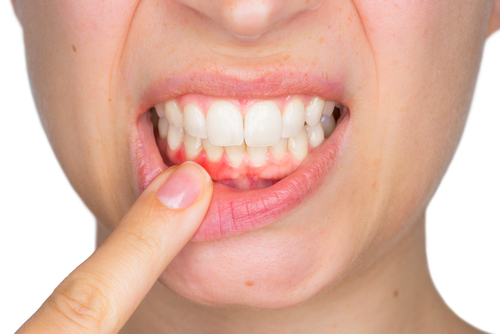What Is Gingivitis?
Gingivitis is the early stage of gum disease. Your gums are an important part of your mouth that helps to stabilise and seal the roots of your teeth and jaw bones. The gums also serve as a protective barrier against harmful bacteria and plaque.
It is caused by the buildup of plaque on the teeth and gums. Plaque is a sticky, colourless film that coats the teeth and gums after eating and drinking that acts as a home for bacteria to grow. When there is too much bacteria in your mouth, it can cause an infection of the gums, known as gingivitis.
If your gums become infected, the surrounding bone, teeth and other tissues can be affected. The good news is, if it is identified and treated quickly, gingivitis is reversible!
Signs of Gingivitis
Surprisingly, many people might not even know if they have gingivitis, as it is often painless.
However, there are some signs and symptoms to look out for:
- Swelling or inflammation of gums
- Tender gums
- Small pockets forming in gums around the teeth
- Bleeding during brushing or flossing
- Receding gums
- Bad breath or a bad taste in the mouth
- Tooth sensitivity to hot and cold
When gingivitis is allowed to progress it can develop into severe periodontitis. Periodontitis is the late stage of gum disease that can lead to tooth loss, bone loss, infection and abscesses. While the infection can be treated, it is always better to ensure your gums stay healthy and prevent gingivitis in the first place.
How To Prevent Gingivitis
There are several simple ways to prevent gingivitis:
1. Good oral hygiene
This is the first and most important step. Good oral hygiene practices such as brushing and flossing help to prevent the buildup of plaque and bacteria in the mouth. Sometimes it can be hard to remove all the plaque from those hard to reach places. When the plaque is not removed it can harden, forming tartar which should be professionally removed by your dentist.
2. See your dentist regularly
Your Brisbane dentist will clean your teeth, removing any plaque or tartar which may be missed when brushing and flossing. Your dentist will also conduct an overall oral check up, and if gingivitis is present, you may be prescribed topical treatments such as special toothpastes or mouthwash to help reduce any harmful bacteria.
3. Eat a healthy diet
Starchy foods such as candy, crackers, pasta and bread can stick to your teeth, and the sugars in these carbohydrates are a breeding ground for bacteria. Fresh vegetables, fruit, cheese and nuts are better choices especially for snacks. Some foods, such as apples, carrots and celery can even help remove plaque as you eat! Healthier foods will also contain minerals and vitamins that contribute to healthy bones and are good for your gums.
4. Stop smoking
If you smoke, stop! Smoking increases the occurrence of small pockets forming around the teeth. It also reduces the blood supply to the gums, and good circulation is important for healthy gums. In addition, smoking also increases the risk for oral cancer.
We hope this article has given you some of the signs to look out for and tips to ensure your gums are healthy. If you have any questions about gingivitis or anything related to oral health, schedule a dental check-up with our friendly team at Underwood Dental Care on 07 3341 9770.

